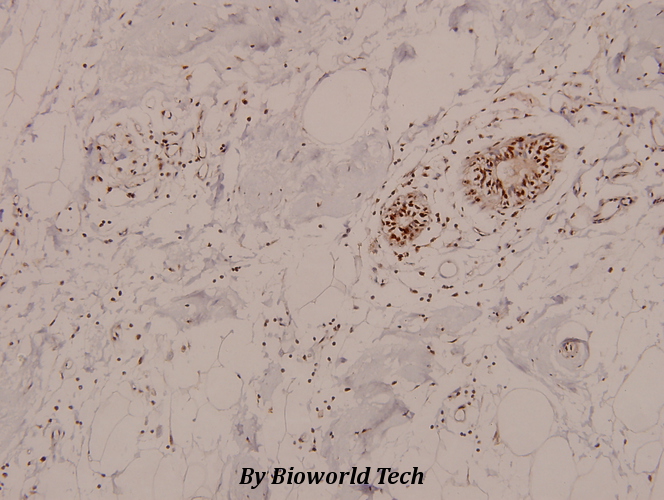Product Name :
AMPKα1/2 (phospho-T183/172) polyclonal antibody Background :
AMPK is a heterotrimeric complex comprising a catalytic α subunit and regulatory β and γ subunits. It protects cells from stresses that cause ATP depletion by switching off ATP-consuming biosynthetic pathways. AMPK is activated by high AMP and low ATP through a mechanism involving allosteric regulation, promotion of phosphorylation by an upstream protein kinase known as AMPK kinase, and inhibition of dephosphorylation. Activated AMPK can phosphorylate and regulate in vivo hydroxymethylglutaryl-CoA reductase and acetyl-CoA carboxylase, which are key regulatory enzymes of sterol synthesis and fatty acid synthesis, respectively. The human AMPKα1 and AMPKα2 genes encode 548 amino acid and 552 amino acid proteins, respectively. Product :
Rabbit IgG, 1mg/ml in PBS with 0.02% sodium azide, 50% glycerol, pH7.2 Storage&Stability :
Store at 4°C short term. Aliquot and store at -20°C long term. Avoid freeze-thaw cycles. Specificity :
p-AMPKα1/2 (T183/172) polyclonal antibody detects endogenous levels of AMPKα1 protein only when phosphorylated at Thr183 and AMPKα2 protein only when phosphorylated at Thr172. Immunogen :
Synthetic phosphopeptide derived from human AMPKα1 around the phosphorylation site of Threonine 183. Conjugate :
Unconjugated Modification :
Phosphorylation
AMPKα1/2 (phospho-T183/172) polyclonal antibody Background :
AMPK is a heterotrimeric complex comprising a catalytic α subunit and regulatory β and γ subunits. It protects cells from stresses that cause ATP depletion by switching off ATP-consuming biosynthetic pathways. AMPK is activated by high AMP and low ATP through a mechanism involving allosteric regulation, promotion of phosphorylation by an upstream protein kinase known as AMPK kinase, and inhibition of dephosphorylation. Activated AMPK can phosphorylate and regulate in vivo hydroxymethylglutaryl-CoA reductase and acetyl-CoA carboxylase, which are key regulatory enzymes of sterol synthesis and fatty acid synthesis, respectively. The human AMPKα1 and AMPKα2 genes encode 548 amino acid and 552 amino acid proteins, respectively. Product :
Rabbit IgG, 1mg/ml in PBS with 0.02% sodium azide, 50% glycerol, pH7.2 Storage&Stability :
Store at 4°C short term. Aliquot and store at -20°C long term. Avoid freeze-thaw cycles. Specificity :
p-AMPKα1/2 (T183/172) polyclonal antibody detects endogenous levels of AMPKα1 protein only when phosphorylated at Thr183 and AMPKα2 protein only when phosphorylated at Thr172. Immunogen :
Synthetic phosphopeptide derived from human AMPKα1 around the phosphorylation site of Threonine 183. Conjugate :
Unconjugated Modification :
Phosphorylation
-

-
 Immunohistochemistry (IHC) analyzes of p-AMPKα1/2 (T183/172) pAb in paraffin-embedded human breast carcinoma tissue at 1:100.
Immunohistochemistry (IHC) analyzes of p-AMPKα1/2 (T183/172) pAb in paraffin-embedded human breast carcinoma tissue at 1:100.
C1q/Tumor Necrosis Factor-Related Protein-3 Attenuates Brain Injury after Intracerebral Hemorrhage via AMPK-Dependent Pathway in Rat
PMCID: Pubmed No.:27807406
PDK4 Protein Promotes Tumorigenesis through Activation of cAMP-response Element-binding Protein (CREB)-Ras Homolog Enriched in Brain (RHEB)-mTORC1 Signaling Cascade
PMCID: Pubmed No.:25164809
Sevoflurane Postconditioning Protects Rat Hearts against Ischemia-Reperfusion Injury via the Activation of PI3K/AKT/mTOR Signaling
PMCID: Pubmed No.:25471136
Modified Si-Miao-San inhibits inflammation and promotes glucose disposal in adipocytes through regulation of AMP-kinase
PMCID: Pubmed No.:25556062
Schisandrin C enhances mitochondrial biogenesis and autophagy in C2C12 skeletal muscle cells: potential involvement of anti-oxidative mechanisms
PMCID: Pubmed No.:29260265
Chicoric Acid Ameliorates Nonalcoholic Fatty Liver Disease via the AMPK/Nrf2/NFκB Signaling Pathway and Restores Gut Microbiota in High-Fat-Diet-Fed Mice
PMCID: Pubmed No.:33204402
Four sesquiterpene glycosides from loquat (Eriobotrya japonica) leaf ameliorates palmitic acid-induced insulin resistance and lipid accumulation in HepG2 Cells via AMPK signaling pathway
PMCID: Pubmed No.:33240683
P2Y1R Ligation Suppresses Th17 Cell Differentiation and Alleviates Colonic Inflammation in an AMPK-Dependent Manner.
PMCID: Pubmed No.:35222397
Metformin protects 5-Fu-induced chemotherapy oral mucositis by reducing endoplasmic reticulum stress in mice
PMCID: Pubmed No.:35405270
Amphibian pore-forming protein βγ-CAT drives extracellular nutrient scavenging under cell nutrient deficiency
PMCID: Pubmed No.:37128610
Picroside III, an Active Ingredient of Picrorhiza scrophulariiflora, Ameliorates Experimental Colitis by Protecting Intestinal Barrier Integrity
PMCID: Pubmed No.:37218365
Bioworld Biotech only provide peptides for our antibodies and do not provide additional peptide customization services.
Price/Size :
USD 368/1mg/vial
Tips:
For phospho antibody, we provide phospho peptide(0.5mg) and non-phospho peptide(0.5mg).Describe :
Blocking peptides are peptides that bind specifically to the target antibody and block antibody binding. These peptide usually contains the epitope recognized by the antibody. Antibodies bound to the blocking peptide no longer bind to the epitope on the target protein. This mechanism is useful when non-specific binding is an issue, for example, in Western blotting (WB) and Immunohistochemistry (IHC). By comparing the staining from the blocked antibody versus the antibody alone, one can see which staining is specific; Specific binding will be absent from the western blot or IHC performed with the neutralized antibody.Formula:
Synthetic peptide was lyophilized with 100% acetonitrile and is supplied as a powder. Reconstitute with 0.1 ml DI water for a final concentration of 10 mg/ml.The purity is >90%,tested by HPLC and MS.
Storage:
The freeze-dried powder is more stable. For short time at 2-8°C. For long term storage store at -20°C.
Note :
This product is for research use only (RUO only). Not for use in diagnostic or therapeutic procedures.
 AMPKα1/2 (phospho-T183/172) polyclonal antibody
AMPKα1/2 (phospho-T183/172) polyclonal antibody  Datasheet
Datasheet COA
COA MSDS
MSDS SHIP
SHIP